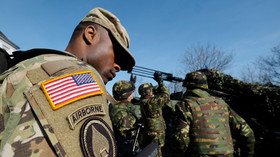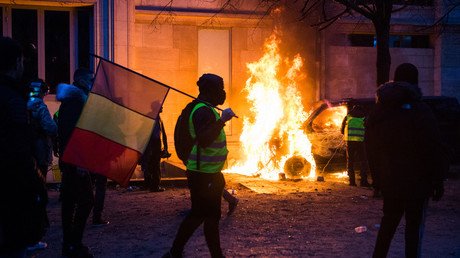Cunning plan: Poland wants to set up a US military base right next to Russia’s Kaliningrad

Poland and the US are reportedly in talks over setting up an American military base on the border with Kaliningrad, the Russian exclave on the Baltic Sea. How serious, and most importantly, how realistic are Warsaw’s plans?
Polish diplomatic sources told Russian paper Izvestiya that a US military base could soon appear very close to Kaliningrad. Even though the final decision is yet to be made, the most likely site for the base has reportedly been picked.
It’s the town of Orzysz, mere 140km (87 miles) away from Kaliningrad. Among its advantages as a location for a permanent military base is Orzysz’s proximity to the Russian border. Besides that, it has all the necessary infrastructure, including a training facility.
READ MORE: ‘Obvious threat’: Russian officials warn Poland not to proceed with permanent US military base
Another argument in favor, which advocates of the idea put forward, is that Orzysz is in the part of Poland that’s key in terms of conducting both defensive and offensive military operations. Polish experts believe that troops deployed here in advance would boost the defensive capacity not only of the northeastern part of the country, but also of the Baltic states. The latter point is questionable, however, as the authors of this idea don’t go into any detail about how it might be implemented when it comes to Lithuania and Latvia, let alone Estonia.
Polish experts are also cited as saying that the permanent presence of US troops in the area would ensure a more effective defense for Poland in general. However, it’s impossible to deploy any substantial military force in terms of manpower and combat strength to a single military base. In a best-scenario, we’re talking about a brigade or a division at most.
However, a hypothetical war with Russia could turn into a protracted world war that would definitely involve coalitions, with their forces and equipment.
Also on rt.com ‘Our build-up is defensive, Russia’s aggressive,’ says NATO after Putin’s remark – but is that fair?To sketch it out, this hypothetical large-scale conflict would involve all-out use of all types of weapons, maximum-intensity hostilities, and – I should emphasize this specifically – constant danger of nuclear weapons, followed by unrestricted use of all means of mass destruction, starting with all the strategic nuclear weapons.
In a war this huge it would be impossible to achieve military objectives of any significance with the force of just one brigade or division.
Looking at such a small number of troops and the location of their base as some kind of staging area for launching an offensive against Russia is also unreasonable. For that, you’d need a fundamentally different kind of military force, and I don’t mean at a tactical level, but at the operational and strategic level. First of all, there has to be an airfield network to allow tactical air forces in.
If Poland wants to get ready for aggression that badly, it needs to start with preparing its territory for battle; the country needs to brace itself for war in general.
In that case, Poland would need to raise adequate troops in terms of numbers and combat strength and think of a plan to efficiently deploy troops to strategic sectors. This would require much more than building a single military base.
In other words, Warsaw would need to get the entire country and its armed forces ready for a full-scale war instead of resorting to half-measures. However, it seems that Poland has not yet started this process and has not even discussed it in fact.
Also on rt.com State Department claims that Russia is stronger than EU is blatant disinformationAs for deploying one brigade or division in eastern Poland, this seems to be a purely cosmetic gesture because it will not boost the country’s defenses significantly. What it will do, however, is further deteriorate relations with Moscow. There are no other foreseeable military or political gains that the current Polish plan can bring about.
But Poland’s fear of a hypothetical armed invasion of its territory by Russia can be explained otherwise. History has shown that on more than one occasion the Western allies of Poland were unprepared to provide it with any palpable help and support other than friendly advice. In September 1939, for example, neither Great Britain nor France did anything at all to help Warsaw reflect the act of aggression which Nazi Germany perpetrated against Poland.
That’s why a deployment of foreign troops on Polish territory could help reach a long-sought-after result as the government of Poland sees it. If a military conflict erupts then NATO forces, primarily US troops, would be involved in fighting, one way or another.
Also on rt.com Cannon fodder for nuclear war: What the US division deployed to Poland will becomeSuch ideas have been circulating among politicians and the military in Warsaw for quite a while. In September, this year the Polish government came up with the idea of building a US military base in Poland, nicknamed “Fort Trump,” which it has been called unofficially ever since.
Today, the viability of a permanent military presence of the US in Poland is under discussion. There are currently about 3,000 US troops deployed in Poland on a rotation basis. Decision makers in Warsaw seem to think that bringing in American troops on a permanent basis will help improve security in the region.
Yet, another increase in NATO’s presence on Russia’s doorstep may in fact undermine stability as Moscow sees the growing military activities of the US-led alliance in eastern Europe as threat to national security.
Russia has repeatedly said that it’s not going to attack anyone but it has to protect its borders against any potential attack. It warned that if a US military base is built on the Polish territory, it will have to take countermeasures. The Kremlin’s press secretary Dmitry Peskov was earlier quoted as saying that Russia would not turn a blind eye to “the breach of parity.”
By Mikhail Khodarenok, military commentator for Gazeta.ru
Bio:
Mikhail Khodarenok is a retired colonel. He graduated from the Minsk Higher Engineering School of Anti-Aircraft Missile Defense (1976) and the Command Academy of the Air Defense Forces (1986).
Commanding officer of the S-75 AA missile battalion (1980-1983).
Deputy commanding officer of a SAM regiment (1986-1988).
Senior officer at the High Command of the Air Defense Forces (1988–1992).
Officer at the main operational directorate of the General Staff of the Armed Forces(1992–2000).
Graduated from the Military Academy of the General Staff of the Armed Forces of the Russian Federation (1998).
Worked as an analyst at Nezavisimaya Gazeta (2000-2003) and editor-in-chief of Voyenno-Promyshlennyi Kuriyer (2010-2015).
Think your friends would be interested? Share this story!
The statements, views and opinions expressed in this column are solely those of the author and do not necessarily represent those of RT.














